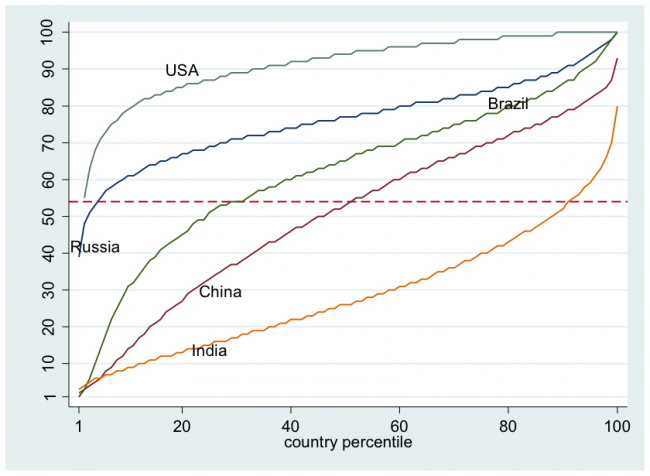Several months ago, a lot of folks where shocked to find that the Clinton Foundation only spent $9 million in direct aid out of a total budget of $150 million, with the rest going to salaries and bonuses and luxury travel for family and friends and other members of the Clinton posse.
None of this surprised me. From my time at Ivy League schools, I know any number of kids from rich families that work for some sort of trust or non-profit that has nominally charitable goals, but most of whose budget seems to go to lavish parties, first-class travel, and sinecures for various wealthy family scions.
But this week comes a story from the climate world that demonstrates that making a fortune from your non-profit is not just for the old money any more -- it appears to be a great way for activists to build new fortunes.
The story starts with the abhorrent letter by 20 university professors urging President Obama to use the RICO statute (usually thought of as a tool to fight organized crime) to jail people who disagree with them in a scientific debate. The letter was authored by Jagadish Shukla of George Mason University, and seems to take the position that all climate skeptics are part of an organized coordinated gang that are actively promoting ideas they know to be wrong solely for financial enrichment. (I will give the near-universal skeptic reply to this: "So where is my Exxon check?!"
Anyway, a couple of folks, including Roger Pielke, Jr. and Steve McIntyre, both folks who get accused of being oil industry funded but who in fact get little or no funding from any such source, wondered where Shukla's funding comes from. Shukla gets what looks like a very generous salary from George Mason University of $314,000 a year. Power to him on that score. However, the more interesting part is where he makes the rest of his money, because it turns out his university salary is well under half his total income. The "non-profits" he controls pays him, his family, and his friends over $800,000 a year in compensation, all paid out of government grants that supposedly are to support science.
A number of years ago Shukla created a couple of non-profits called the Institute for Global Environment and Security (IGES) and the Center for Ocean Land Atmosphere Interactions (COLA). Both were founded by Shukla and are essentially controlled by him, though both now have some sort of institutional relationship with George Mason University as well. Steve McIntyre has the whole story in its various details.
COLA and IGES both seem to have gotten most of their revenues from NSF, NASA, and NOAA grants. Over the years, the IGES appears to have collected over $75 million in grants. As an aside, this single set of grants to one tiny, you-never-even-heard-of-it climate non-profit is very likely way higher than the cumulative sum total of all money ever paid to skeptics. I have always thought that warmists freaking out over the trivial sums of money going to skeptics is a bit like a football coach who is winning 97-0 freaking out in anger over the other team finally picking up a first down.
Apparently a LOT of this non-profit grant money ends up in the Shukla family bank accounts.
In 2001, the earliest year thus far publicly available, in 2001, in addition to his university salary (not yet available, but presumably about $125,000), Shukla and his wife received a further $214,496 in compensation from IGES (Shukla -$128,796; Anne Shukla – $85,700). Their combined compensation from IGES doubled over the next two years to approximately $400,000 (additional to Shukla’s university salary of say $130,000), for combined compensation of about $530,000 by 2004.
Shukla’s university salary increased dramatically over the decade reaching $250,866 by 2013 and $314,000 by 2014. (In this latter year, Shukla was paid much more than Ed Wegman, a George Mason professor of similar seniority). Meanwhile, despite the apparent transition of IGES to George Mason, the income of the Shuklas from IGES continued to increase, reaching $547,000 by 2013.
Grant records are a real mess but it looks like from George Mason University press releases that IGES and its successor recently got a $10 million five-year grant, or $2 million a year from the government. Of that money:
- approximately $550,000 a year goes to Shukla and his wife as salaries
- some amount, perhaps $90,000 a year, goes to Shukla's daughter as salary
- $171,000 a year goes as salary to James Kinter, an associate of Shukla at George Mason
- An unknown amount goes for Shukla's expenses, for example travel. When was the last time you ever heard of a climate conference, or any NGO conference, being held at, say, the Dallas-Ft Worth Airport Marriott? No, because these conferences are really meant as paid vacation opportunities as taxpayer expense for non-profit executives.
I don't think it would be too much of a stretch, if one includes travel and personal expenses paid, that half the government grants to this non-profit are going to support the lifestyle of Shukla and his friends and family. Note this is not money for Shukla's research or lab, this is money paid to him personally.
Progressives always like to point out examples of corruption in for-profit companies, and certainly those exist. But there are numerous market and legal checks that bring accountability for such corruption. But nothing of the sort exists in the non-profit world. Not only are there few accountability mechanisms, but most of these non-profits are very good at using their stated good intentions as a shield from scrutiny -- "How can you accuse us of corruption, we are doing such important work!"
Postscript: Oddly, another form of this non-profit scam exists in my industry. As a reminder, my company privately operates public recreation areas. Several folks have tried to set up what I call for-profit non-profits. An individual will create a non-profit, and then pay themselves some salary that is equal to or even greater than the profits they would get as an owner. They are not avoiding taxes -- they still have to pay taxes on that salary just like I have to pay taxes (at the same individual tax rates) on my pass-through profits.
What they are seeking are two advantages:
- They are hoping to avoid some expensive labor law. In most cases, these folks over-estimate how much a non-profit shell shelters them from labor law, but there are certain regulations (like the new regulations by the Obama Administration that force junior managers to be paid by the hour rather than be salaried) that do apply differently or not at all to a non-profit.
- They are seeking to take advantage of a bias among many government employees, specifically that these government employees are skeptical of, or even despise, for-profit private enterprise. As a result, when seeking to outsource certain operations on public lands, some individual decision-makers in government will have a preference for giving the contract to a nominal non-profit. In California, there is even legislation that gives this bias a force of law, opening certain government contracting opportunities only to non-profits and not for-profits.
The latter can have hilarious results. There is one non-profit I know of that is a total dodge, but the "owner" is really good at piously talking about his organization being "cleaner" because it is a non-profit, while all the while paying himself a salary higher than my last year's profits.





